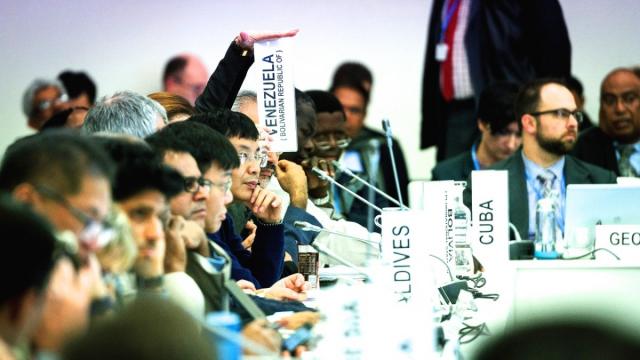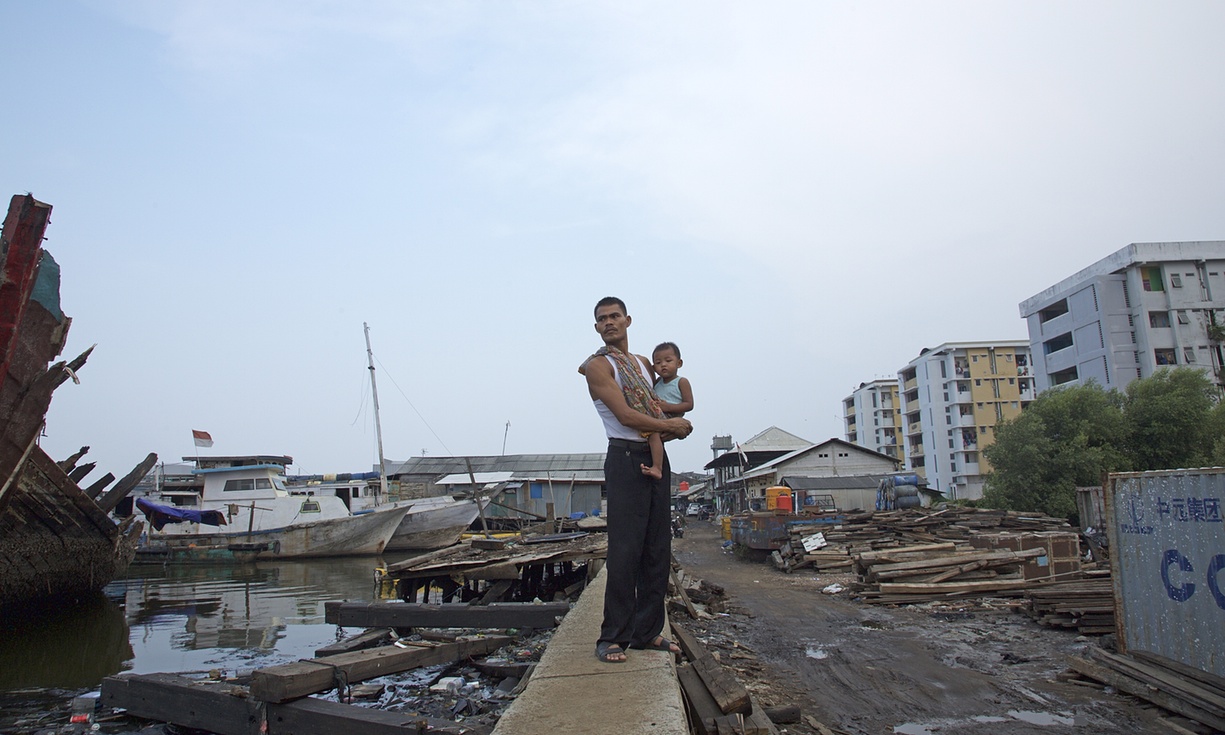
Negotiators at the UN climate talks in Paris are now nearing the end of a fortnight of searching for a global deal on climate change. The mood is upbeat but there are still significant disagreements over some key issues. They came out in the publication on Wednesday of the draft negotiating text.
These are the six key roadblocks that negotiators will have to move or get around if a deal is to be done:
Temperature Goal: 1.5ºC or 2ºC
The disagreement here is over what temperature rise (with a baseline of pre-industrial times) the politicians set as the goal for the world to stick to. Even fractions of a degree could make big differences in terms of the impacts from sea level rise and extreme weather the world is likely to see.
Small islands and low-lying states are at risk of disappearing under rising seas even at the currently agreed 2ºC temperature goal, and have long argued for tougher limits on warming. Last June, a group of more than 40 countries adopted the slogan “1.5 to stay alive.” They now have the support of more than 80 countries, including the US, Canada and Europe, who call themselves the “high ambition coalition.”
But is 1.5ºC even possible given warming to date and that already built into the system? “The maths is simple,” according to Myles Allen, a climate scientist at Oxford. “Human-induced warming is already close to 1C, so to limit warming to 2C, CO2 emissions need to fall, on average, by 10% of today’s emission rate for every tenth of a degree of warming from now on. To limit warming to 1.5C, CO2 emissions need to fall, on average, by 20% for every tenth of a degree of warming. At the rate we’re warming at the moment, a tenth of a degree means five to 10 years. So 1.5 will be tough.”
That presents a serious problem for a diplomatic process that must be rooted in the science. Michael Oppenheimer, a Princeton University climate scientist and a longtime observer of the international climate negotiations, suggested 1.5ºC could remain as an aspirational goal, alongside 2ºC – but it would be problematic if it were the only goal.
“If you put it as an agreed goal you would probably have a large fraction of the expert community saying you can’t do this and it’s very unlikely. The net effect of that is that it would undermine the credibility of the process because people would get the impression, rightly so, that diplomats are agreeing to things that are totally unrealistic just for the sake of producing an outcome and getting out of the room.” The draft released by the French hosts on Wednesday has three options: 1. below 2ºC, 2. well below 2ºC with efforts to reach 1.5ºC and 3. 1.5ºC.
Zero Emissions
Getting to 1.5ºC or 2ºC requires achieving near zero greenhouse gas emissions by the second half of this century. Business leaders, some campaign groups and even the Pope have called on negotiators to adopt a decarbonization goal as a way of translating temperature goals into more tangible targets for action. How and when are the big questions, and language is critical. Net zero means emissions can continue but must be balanced by negative emissions efforts such as tree planting or technologies to suck emission from the air.
The draft released on Wednesday has two main options. Under option 1, the stronger option, countries aim to peak global greenhouse gas emissions as soon as possible, with rich countries making deep emissions cuts by 2050 with an end goal of net zero greenhouse gas emissions. Even here, there are divisions on the scale of cuts and the date for reaching net-zero, mid-century or end century. Under option 2, countries would commit only to a vague goal of reaching climate neutrality over the course of the century, with no specific targets or dates.
Money
Finance was the big issue leading into these negotiations. Developing countries need funding to reduce their greenhouse gas emissions, and build the infrastructure that will help protect their people from extreme weather and other climate impacts. Best estimates suggest it will cost trillions to transform the global economy. Rich countries committed to rounding up $100 billion a year from private and public sources by 2020. Best estimates suggest the pot is currently only two-thirds full – and rising economies such as India and Brazil say the accounting is murky.
Developing countries are demanding stronger guarantees rich countries will deliver on their pledges in 2020 and beyond – and that there will be more funds available to deal with the climate impacts they are already experiencing. To date, only about a quarter of climate funding has been directed towards dealing with those impacts, and countries say that is not a big enough fraction. The U.S. doubled its climate aid to $860 million on Wednesday. Developing countries will be looking to other developed countries to do more.
Loss and Damage
Some low-lying and vulnerable countries are facing irreversible and permanent damage from climate change. Land loss could force millions to relocate. Those countries want the agreement to recognize those dangers, and offer some measure of protection. But the U.S. is adamantly opposed to any language in the agreement about liability or compensation that could potentially expose U.S. companies to the threat of lawsuits for causing climate change.
“Loss and damage as an idea is meant to refer to the impacts of climate change that neither mitigation nor adaptation has been able to address and in so far as there is a focus on that kind of element, that is completely appropriate,” Todd Stern, the state department climate change envoy, said. “We don’t accept the idea of compensation and liability. We have never accepted and we are not going to accept it now.”
The choices before negotiators in the draft released on Wednesday range from burying any reference to loss and damage in a separate section of the text to setting up an entirely separate process to look at the problems of land loss and climate refugees.
Future Improvements to the Deal
Governments at the Paris meeting have come out with lofty ambitions, unlike other climate talks, and there is a sense of momentum towards an agreement. But what about the follow-through? Industrial countries in particular are pushing hard for public reporting of all countries emissions reductions, a so-called “stocktaking,” which would subject climate laggards to public shaming. The U.S. and other countries are pushing for an early stocktaking in 2018. Developing countries are trying to push back the first inventory to 2024.
Then there is “ratcheting.” Developed countries are pushing for governments to put forward tougher emissions plans at five-year intervals, in order to take advantage of advances in clean energy technology, and improve the chances of getting to zero emissions in the middle of the century. India and other developing countries want to put off those ratchet meetings to once a decade or so.
Developed vs. Developing World
This is the biggest stumbling block because the question about differentiation is rooted in history, unlike other areas of talks which are about actions in the future. Who should bear responsibility for climate change – the countries that industrialized first and were responsible for historic emissions, or developing countries such as China, now the world’s biggest emitter? The bigger developing countries argue they did little or nothing to cause climate change but are being asked to trim their growth to reduce emissions.
The U.S. insists that the current structure of the agreement, which relies on voluntary pledges put forward by each country, acknowledges those differences in economic history. “This is all about differentiation,” John Kerry, the secretary of state, said.
India which has played a strong leadership role in the developing country bloc in the Paris negotiations, said the new structure represents progress, but that rich countries should not be trying to re-write history. “Today the world is experiencing and many countries are suffering because of a temperature rise of 0.8C and that temperature rise has taken place because of historic emissions of 150 years so that can not be wished away,” Prakash Javadekar, India’s environment minister, said. “Historic emissions are responsible.”
3 WAYS TO SHOW YOUR SUPPORT
- Log in to post comments
















